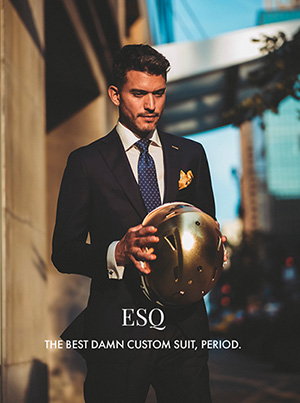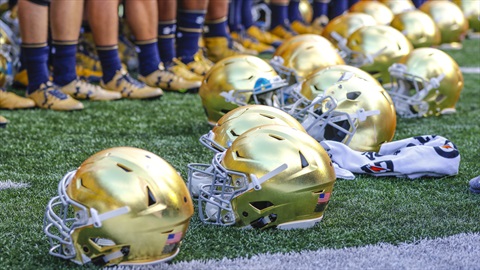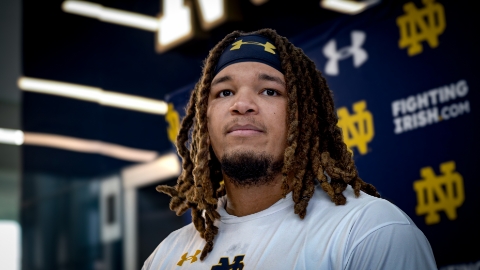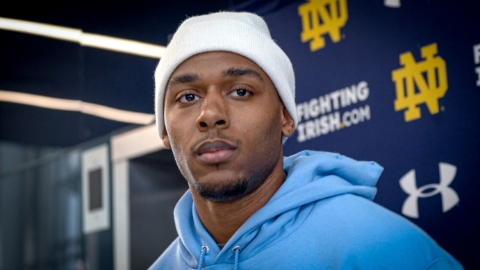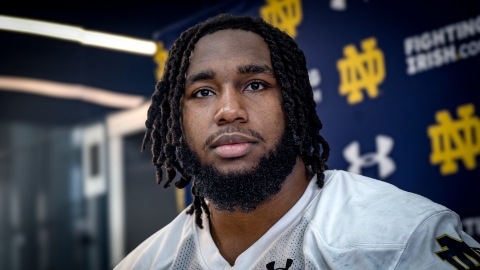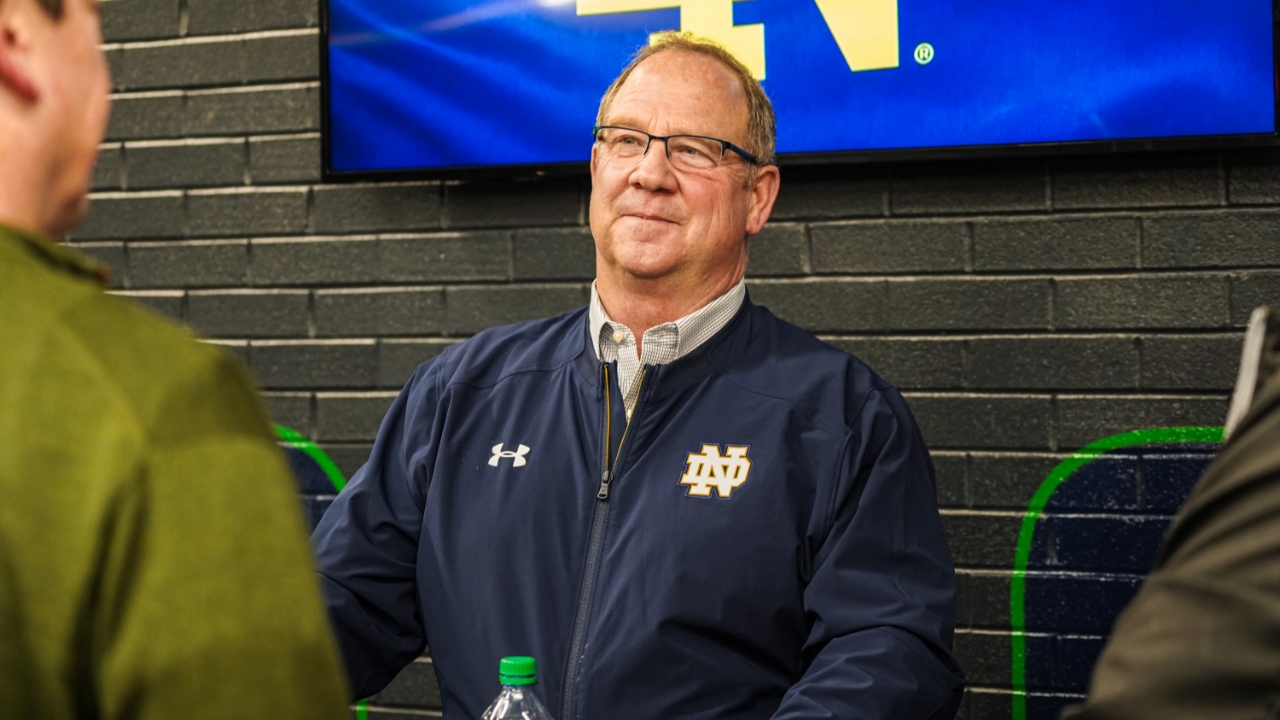
Harry Hiestand is a stickler for the details, and it’s perhaps the singular trait – that, and Hiestand’s unflinching loyalty to his charges – that players most mention about the well-regarded offensive line coach.
Thursday, as Notre Dame continues to wind its way to the conclusion of spring camp, Hiestand met with media for nearly 20 minutes inside the Irish Athletics Center – after, of course, Hiestand continued to hone the minutiae of the position group with players in Hiestand’s customary after-practice tutoring session.
Q: How has Zeke Correll handled things this spring at center?
HH: He’s definitely doing a good job, keeping the offense moving. It’s nice to have an experienced guy when something like that happens, you don’t have to go to a freshman or a real young guy who’s just figuring it out. He’s been in the battles before, so that’s been a positive.
Q: How has Carmody’s transition to that spot gone?
MM: Very hard for him, wasn’t really fair to him, but he’s a very good athlete so he made the adjustment pretty good. He didn’t start snapping until (Jarrett Patterson) got injured, so he had a short period of time to really get ready and just did tons of it. But being a good athlete, he doesn’t have too many balls that are hard for a quarterback and he has an ability to move in there pretty good. He made the adjustment, great sacrifice by him, not easy to do.
Q: What’s the hardest part? The act of snapping?
HH: I can’t remember the last high school center, actual center. Duke Preston at Illinois was actually a center, Nick Martin was another position, Sam (Mustipher).
Q: What do you look for when you’re thinking about making that switch for a guy from guard or tackle to center?
HH: Normally it’s a guy that has football intelligence. It’s like when you’re discussing football with them, they get it quickly. Some guys you have to explain it a little bit more to. Your center needs to be a guy that can transfer information quickly and make adjustments, make calls, see things.
IN the progression of learning how defenses align, what things are telling us, how we want to make our calls. When you’re like struggling to get him to get that, it’s probably not a center. It’s like really anything, if you’re talking to someone who’s getting what you mean, well, this person is on top of it. It makes sense to them. Not everybody can do it.
That’s the way Sam (Mustipher) was when we first talked about moving him to center. He got it; it wasn’t a labor for him, where he’s like, every day you’re repeating yourself. You can’t do that. So it’s just kind of guys with just football, a little bit of extra football smarts and then you’ve got to be athletic enough.
Q: What does it mean to you to have these guys that you previously coached come back to Notre Dame and be around you and the players and the program this spring?
HH: Everything. Everything. It’s why you coach. The best part of the job has always been the players, and at Notre Dame they’ve really been a unique, awesome group of young men and to see them come back that means everything to me.
Q: You’ve always cross-trained guys very well, but what’s the key to cross-training them effectively versus settling on the position that is best for them?
HH: In some cases, there are guys that you don’t want to move, that don’t have (cross-training skills), so you have to make that decision individually.
Some of them can handle it and some of them it holds them back from becoming the player they’re capable of being. Like Q (Quenton Nelson), once we settled on left guard we never messed around with left guard and he loved the repetition of doing the same footwork the same way. He was so prideful about how he did it, that when you would start over at another spot, his frustration would go up and affect his play.
Certain guys have the ability to do that, and it’s not good or bad; people are different. So we don’t do it with everyone, but like Alex Bars played really all three spots here in practice. Never played center in a game here but he practiced, he was our second center for like six or seven weeks. Then he goes to the NFL and his first start was center, and he hadn’t played any center there. But they had a bunch of guys with COVID, they go down to the Tennessee Titans and all these people are dropping off and they throw Bars the ball. But he could always do that, and he played the whole game and had no bad snaps and did fine.
Q: So when a guy doesn’t have that one natural, dominant position and he is able to cross-train, how important does that versatility become?
HH: It’s super-valuable, yep. It’s nice to have guys that can do that. You always test them just to see how they do, and you’ve got to be careful and watch close and, (say), ‘OK, he’s not progressing the way he’s capable of, let’s dial him in on one spot.’ That’s something we’re always conscious of, as we study the film and watch them. Are they progressing? Sometimes you move them and they take a step back and you gotta stop moving them and let them go.
Q: What’d you find from Blake Fisher and Joe Alt when you got here?
HH: Two young players, unfortunately for Blake, he didn’t get to play a lot of football with his injury, just two games. Really just one-and-a-half, really. Both guys super-willing, super-interested in being good, very driven to be good. Love football. Really a jot to be around, want to get better every day.
Q: What are your points of emphasis for their improvement?
HH: Well, everybody’s got tons of stuff to work on. When you’re a young player, the No. 1 thing is recognizing what’s going on in front of you. As defenses attack our offense, studying how defenses do that, how they change alignments, which dictate the pressures and blitzes and getting used to paying close attention to that. The two hardest things high school players normally have is recognizing defenses, because they don’t see a bunch of (different defenses); you know, one week they might see two defenses and here you’ll see two defenses in two plays. So that’s a little bit of a shock.
The second thing is that the guys you’re working against are as big as you. Those two things take a little bit of time for getting used to. Suddenly when I made contact, the guy just doesn’t go that way (back), ‘Oh, geez. I gotta strain through.’ Those two things take time, and that’s one of the things that Blake is working through now, this is really his 10th practice of going full-bore, healthy, feeling good and now he’s getting in all those situations. You’ve got to feel to get better.
Consistency (for Alt and Fisher is key). Our expectation now is every snap would look like that.
Q: Kristofic started about the second half of last season. What have you seen from his development?
HH: Older guy, experienced, been around, good strength, good toughness. He hasn’t had a lot of snaps, he had them this year, but he’s an older guy with not a lot of repetitions in a game, so he’s mature that way, he knows how to study. He’s making steady progress. His big thing, really I would repeat the same thing for just about everyone, there’s not anything they can’t do, it’s just our ability to do it, play-in and play-out, needs a lot of work. There’s no, if you fix this, boy he’s special. It’s just kind of a little bit of everything.
And that’s natural when they’re being asked to do things differently than what they’ve been asked to do.
Q: Ever seen anything like what happened last year at ND, with so many different starting tackles at left and right and injuries and the way that shook out?
HH: Then you combine that with the COVID issues, then a guy like Tosh Baker, talking with Matt Balis, (Baker) missed like a whole cycle of weight training that every other … when you go back three years, none of those freshmen missed all that time in the weight room, and you can’t make that up fast. You need that eight months, 12 months, then when you’re a redshirt not playing, the extra workout you do every week, that stuff accumulates for them. It was the opposite for (Baker). Then get back and somebody would test positive and you sit in a room for two weeks. Then you’re not allowed to do anything.
That group of guys were really affected by it, particularly the linemen were, and that’s so critical for your ability to go out and compete on the field, is in that strength training part that just wasn’t happening for like a year-and-a-half of this thing.
(Baker) is making progress, just repetitions. He’s making good progress just by repetitions.
Q: Why Fisher right and Alt left? Or could you flip-flop them?
HH: Yeah, especially after 10 practices, I just left them where they had played last. They’ve both got the size and range to play the edges on either side. Blake right now is maybe a little more powerful, is more powerful as a run blocker. Some of the stuff we do to the right is a little different than what’s going on to the left, there’s just more power there.
Q: What have you seen from Rocco Spindler?
HH: He’s a battler, he’s a fighter. You love him, you can’t not love the kid. He loves football, he pours his heart and soul into every practice, he fights like hell. And he’ll make mistakes because he’s young, but it’s not because of lack of effort. Just love his demeanor and the way he appreciates the sport, getting after it. Physical, loves contact. Some guys like contact more than others, he loves contact. Hard not to like him.
Q: Is it hard for him to overtake someone or can he battle for a starting spot?
HH: He’s battling, yeah. He’s making a lot of progress, and I’m excited about his progress.
Q: What do you remember about Josh Lugg the recruit, the freshman lineman and now the sixth-year senior who’s seen kind of everything?
HH: He’s who I think he is, we’ve known him for a long time. Super-team oriented guy that brings it every day. Just loves Notre Dame, loves these players, loves this program; you can always count on him, he’s going to be there ready to go.
Q: How is he doing back at guard?
HH: He’s handled, when you have a lot of experience, it’s real helpful and he’s handled it well. He’s getting better.
Q: How are the two freshmen offensive linemen coming along?
HH: The thing about Billy that’s unbelievable, four days here and then major surgery and he’s rolling around campus with snow. His leg’s in the air, in the ice, and he never has a bad day. He has every right to complain and say, ‘Boy, woe is me.’ Never. We talked about that in meeting a little bit the other day, get banged up out here, start feeling a little sorry for yourself, and I pointed out, ‘Have any of you in here seen Billy have a bad day?’ They go, ‘No.’ He has every right to have a bunch of bad days, he still should be in high school and he’s got a busted leg and can’t do anything and he’s going to be really exciting to be around. Anybody with an attitude like that when faced with major adversity, which it was, there’s something there and special that we’ll see, eventually.
The same thing with Joey, really freak thing, scary. Just blessing that he’s dealing with what he’s doing with and that it wasn’t worse. It was a terrible accident, I saw a picture of the car. It was terrible. Right where he was sitting. His mom bought a place in South Bend. His sister was driving him to the Gug in the morning for morning workouts and he was asleep and reclining and it was probably a good thing because his body was limp and a car ran a red light and hit him right where he was sitting. So if he’d been awake and like braced or something, they always say if that happens, you’re better off to be kind of (loose). So that’s been unfortunate for those two. But they’re great kids.
We’re hoping but we don’t know yet (if Joey can get cleared to resume activities by the end of spring). He’s not there yet.
(Billy) will be full-bore once we come back for June, from the way I understand it. I’m not 100% sure on the injuries.
Notre Dame Fighting Irish Additions Performance 2.0 Polo

